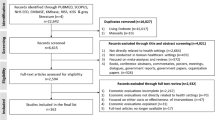Abstract
Objective
To identify, evaluate, and characterize the variety, quality, and intent of the health economics and outcomes research studies being conducted in SAARC (South Asian Association for Regional Cooperation) nations.
Methods
Studies published in English language between 1990 and 2015 were retrieved from Medline databases using relevant search strategies. Studies were independently reviewed as per Cochrane methodology and information on the type of research and outcomes were extracted. Quality of reporting was assessed.
Results
Of the 2638 studies screened from eight SAARC nations, a total of 179 were included for review (India = 140; Bangladesh = 12; Sri Lanka = 8; Pakistan = 7; Afghanistan = 5; Nepal = 4; Bhutan = 2; Maldives = 1). The broad study categories were cost-effectiveness analyses (CEAs = 76 studies), cost analyses (35 studies), and burden of illness (BOI=26 studies). The outcomes evaluated were direct costs, indirect costs, and incremental cost-effectiveness ratio (ICER), quality-adjusted life-years (QALYs), and disability-adjusted life-years (DALYs). Cost of medicines, consultation and hospital charges, and monitoring costs were assessed as direct medical costs along with non-direct medical costs such as travel and food for patients and caregivers. The components of indirect costs were loss of income of patients and caregivers and loss of productivity. Quality of life (QoL) was assessed in 48 studies. The most commonly used instrument for assessing QoL was the WHO-Quality of Life BREF (WHOQOL-BREF) questionnaire (76%). The Quality of Health Economic Studies (QHES) score was used for quality assessment of full economic studies (44 studies). The mean QHES score was 43.76.
Conclusion
This review identifies various patterns of health economic studies in eight SAARC nations. The quality of economic evaluation studies for health care in India, Bangladesh, Sri Lanka, Pakistan, Afghanistan, Nepal, Bhutan, and Maldives needs improvement. There is a need to generate the capacity of researchers to undertake quality economic evaluations as well as an orientation of the policy makers so that there is a demand for such studies as well as a scope for its use in policy making.
Similar content being viewed by others
References
Sollenius O, Petrén S, Björnsson L, Norlund A, Bondemark L. Health economic evaluations in orthodontics: a systematic review. Eur J Orthod. 2016;38:259–265.
Ahuja J, Gupta M, Gupta AK, Kohli K. Pharmacoeconomics. Natl Med J India. 2004;17:80–83.
Prinja S, Chauhan AS, Angell B, Gupta I, Jan S. A systematic review of the state of economic evaluation for health care in India. Appl Health Econ Health Policy. 2015;13:595–613.
Ahmad A, Patel I, Parimilakrishnan S, Mohanta GP, Chung H, Chang J. The role of pharmacoeconomics in current Indian healthcare system. J Res Pharm Pract. 2013;2:3–9.
Tarn YH, Hu S, Kamae I, et al. Health-care systems and pharmacoeconomic research in Asia-Pacific region. Value Health. 2008;11(suppl 1):S137–S155.
Mishra D, Nair SR. Systematic literature review to evaluate and characterize the health economics and outcomes research studies in India. Perspect Clin Res. 2015;6:20–33.
Acharya M. Pharmacoeconomic studies in Nepal: the need of the hour. Front Pharmacol. 2014;5:272.
Hoque ME, Khan JA, Hossain SS, et al. A systematic review of economic evaluations of health and health-related interventions in Bangladesh. Cost Eff Resour Alloc. 2011;9:12.
Ofman JJ, Sullivan SD, Neumann PJ, et al. Examining the value and quality of health economic analyses: implications of utilizing the QHES. J Manag Care Pharm. 2003;9:53–61.
Bansal VK, Misra MC, Babu D, et al. Comparison of long-term outcome and quality of life after laparoscopic repair of incisional and ventral hernias with suture fixation with and without tacks: a prospective, randomized, controlled study. Surg Endosc. 2012;26:3476–3485.
Dranitsaris G, Truter I, Lubbe MS, Sriramanakoppa NN, Mendonca VM, Mahagaonkar SB. Improving patient access to cancer drugs in India: using economic modeling to estimate a more affordable drug cost based on measures of societal value. Int J Technol Assess Health Care. 2011;27:23–30.
Brown MM, Brown GC, Sharma S, Landy J. Health care economic analyses and value-based medicine. Surv Ophthalmol. 2003;48:204–223.
Jahanlou AS, Karami NA. WHO quality of life-BREF 26 questionnaire: reliability and validity of the Persian version and compare it with Iranian diabetics quality of life questionnaire in diabetic patients. Prim Care Diabetes. 2011;5:103–107.
Desai PR, Chandwani HS, Rascati KL. Assessing the quality of pharmacoeconomic studies in India: a systematic review. Pharmacoeconomics. 2012;30:749–762.
Author information
Authors and Affiliations
Corresponding author
Rights and permissions
About this article
Cite this article
Mehta, M., Nerurkar, R. Evaluation and Characterization of Health Economics and Outcomes Research in SAARC Nations. Ther Innov Regul Sci 52, 348–353 (2018). https://doi.org/10.1177/2168479017731583
Received:
Accepted:
Published:
Issue Date:
DOI: https://doi.org/10.1177/2168479017731583




